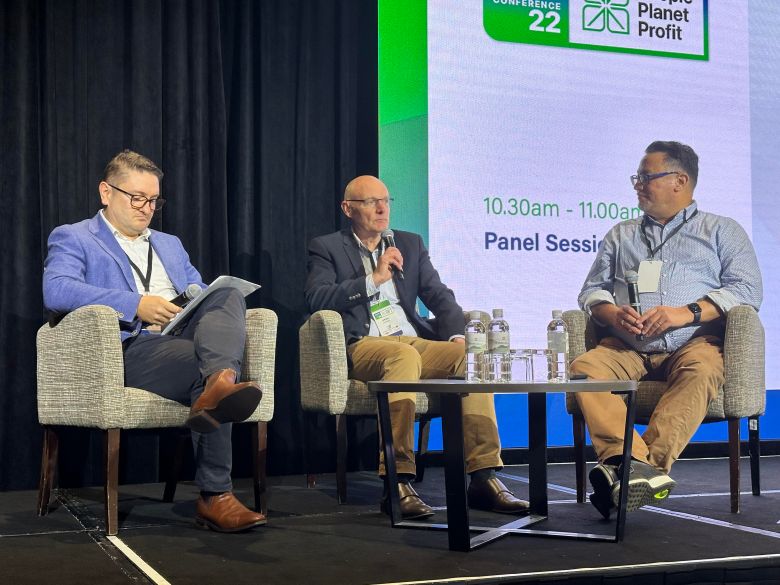
There is no doubt that our industry is doing great work in the circular economy space. But while we are making progress, there is still much to be done, according to a panel session at the recent FESPA conference in Sydney.
This panel, consisting of AFI Branding general manager Jeff Barr, Avery Dennison A/NZ and ASEAN graphics solutions business director Jordan Leach and Coritex national sales and business development manager Julian Lowe, addressed innovative ways that the industry is reducing its carbon footprint and responding to consumer demands.
Barr and Lowe spoke about the industry-first fabric takeback scheme that AFI Branding and Coritex recently partnered on, which diverted more than 250 tonnes of fabric from landfill.
Barr said the idea first came about during AFI Branding’s tender to be the signage contractor for the Gold Coast Commonwealth Games in 2017, where one of the key components of the tender was to be a plan around recycling and sustainability.
“A key part of our response needed to be around what happens to the kilometres of fabric that we’ve printed once the event is over. We weren’t just going to put it in the bin and throw it away. So, we had to work out what we were going to do with it,” he said.
“It ended up coming back to AFI, getting re-bundled, wrapped, packed, and sent to India where it got grinded down. And that fabric is now being used for mattresses with Sealy and home insulation.”
Lowe said he had been working with the Circular Center on ways to get rid of textile waste, and connected AFI Branding to the textile waste facilities.
“When I was at Next Printing, I noticed large amounts of textile going to waste. And we had been chasing down somebody who could grind it, who we found. We then connected AFI Branding to the textile waste facilities,” he said.
Leach spoke about Avery Dennison’s new purpose-built facility in Melbourne which showcases sustainable building design.
“This was a people driven initiative in collaboration with our customers and their end users. We’ve got an open solution where we’re taking any of the end caps back from the industry. And that then becomes a feeder stock into the manufacturing process of outdoor furniture, and agricultural products,” he said.
“It’s not just us but a lot of brands are leading the way when it comes to sustainability. So, it’s now about us educating our customers to get them on board and understand the impacts of their choices.
“That’s one way. The other way is to collaborate with your customers to come up with great sustainable solutions. But you’ve got to get out there want to be a leader in that space.”
When talking about greenwashing claims, Barr stressed the importance of transparency, and using independent companies to verify sustainability goals and progress against those goals.
“Transparency is absolutely key; otherwise, you’ll never gain the trust of people. We’re very transparent in the work that we do and the lifecycle of our products,” he added.
Lowe also said he sees sustainability and the circular economy growing in trend in the near future.
“People continue to want to be more sustainable, whether it’s in their personal circles or professional lives. It’s continually gaining, so it’s all about having the solutions you can bring to market that are sustainable and economically viable for those in the supply chain,” he said.
Comment below to have your say on this story.
If you have a news story or tip-off, get in touch at editorial@sprinter.com.au.
Sign up to the Sprinter newsletter
